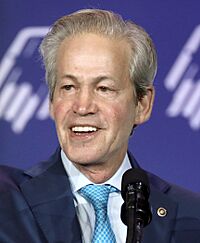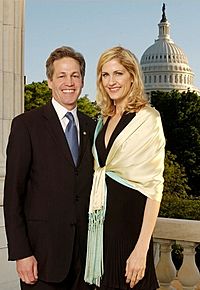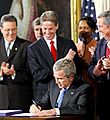Norm Coleman facts for kids
Quick facts for kids
Norm Coleman
|
|
|---|---|
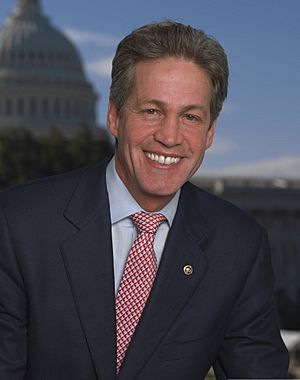
Official portrait, 2005
|
|
| United States Senator from Minnesota |
|
| In office January 3, 2003 – January 3, 2009 |
|
| Preceded by | Dean Barkley |
| Succeeded by | Al Franken |
| 52nd Mayor of Saint Paul | |
| In office January 1, 1994 – January 1, 2002 |
|
| Preceded by | James Scheibel |
| Succeeded by | Randy Kelly |
| Personal details | |
| Born |
Norman Bertram Coleman Jr.
August 17, 1949 New York City, U.S. |
| Political party | Republican (1996–present) |
| Other political affiliations |
Democratic (before 1996) |
| Spouse |
Laurie Casserly
(m. 1981) |
| Children | 4 |
| Relatives | Julia Coleman (daughter-in-law) |
| Education | Hofstra University (BA) University of Iowa (JD) |
Norman Bertram Coleman Jr. (born August 17, 1949) is an American politician, lawyer, and lobbyist. He served as a United States Senator for Minnesota from 2003 to 2009. Before that, he was the mayor of Saint Paul, Minnesota, from 1994 to 2002.
Coleman began his political career as a member of the Democratic–Farmer–Labor Party (DFL). However, in 1996, he switched to the Republican Party. He was elected to the U.S. Senate in 2002. In 2008, he ran for reelection but lost in a very close race. As of 2025, he is the last Republican to represent Minnesota in the U.S. Senate.
After leaving the Senate, Coleman became a lobbyist. He is the chairman of the Republican Jewish Coalition and the conservative group American Action Network. He also works as a lobbyist for the government of Saudi Arabia.
Contents
Early Life and Education
Norm Coleman was born in Brooklyn, New York. His parents were Norman Bertram Coleman Sr. and Beverly Coleman. His family is Jewish. He went to James Madison High School in Brooklyn and later attended Hofstra University on Long Island.
In college, Coleman was active in student government and was elected president of the student senate. He attended Brooklyn Law School for two years before earning his law degree from the University of Iowa College of Law in 1976.
Political Career
After law school, Coleman worked in the Minnesota Attorney General's office. He started as a prosecutor and later became the chief prosecutor and then solicitor general.
Mayor of Saint Paul (1994–2002)
In 1993, Coleman was elected mayor of St. Paul, Minnesota's capital city. One of his major achievements was bringing a professional ice hockey team back to Minnesota. The Minnesota North Stars had moved to Texas, but in 1997, St. Paul was awarded a new team, the Minnesota Wild. A new arena, the Xcel Energy Center, was built for the team.
As mayor, Coleman also focused on the city's finances. He worked to prevent property tax increases during his eight years in office. Under his leadership, the city's job rate grew, and 18,000 new jobs were created.
In 1996, Coleman switched from the Democratic to the Republican Party. He was reelected as mayor in 1997 as a Republican. He is the last Republican to have served as mayor of St. Paul.
1998 Run for Governor
In 1998, Coleman ran for governor of Minnesota. He won the Republican nomination but lost in the general election to Jesse Ventura, a candidate from the Reform Party.
U.S. Senator for Minnesota (2003–2009)
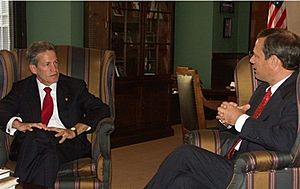
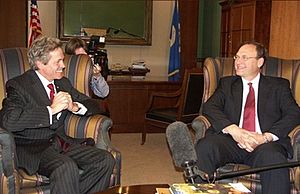
In 2002, Coleman decided to run for the U.S. Senate against the current senator, Paul Wellstone. The race was very close. Tragically, Senator Wellstone died in a plane crash just a few weeks before the election. The Democratic Party chose former Vice President Walter Mondale to be their new candidate. Coleman won the election, defeating Mondale by a small margin.
During his time in the Senate, Coleman was involved in many important issues. In 2003, he apologized for a comment that some people found insensitive about Senator Wellstone. He explained that he never meant to disrespect Wellstone's memory.
The 2008 Senate Election
In 2008, Coleman ran for a second term in the Senate. His main opponent was Al Franken. The election was one of the closest in U.S. history. The first count showed Coleman slightly ahead. However, because the difference was so small, an automatic recount was required by Minnesota law.
The recount showed that Franken had won by 225 votes. Coleman's team challenged the result in court. After months of legal processes, including counting more ballots, Franken's lead grew to 312 votes.
On April 13, 2009, a panel of three judges declared Franken the winner. Coleman appealed to the Minnesota Supreme Court, which also ruled in Franken's favor on June 30. After the court's decision, Coleman conceded the election.
Life After Politics
After leaving the Senate, Coleman did not run for office again, though many expected him to run for governor in 2010. Instead, he became involved in other work. In 2009, he became an adviser to the Republican Jewish Coalition and later its chairman.
In 2010, he co-founded and became the CEO of the American Action Network, a group that promotes conservative policies.
Lobbying Work
In 2011, Coleman began working as a senior government advisor for Hogan Lovells, a global law firm in Washington, D.C. A lobbyist is someone who tries to persuade government officials to support certain policies or causes.
Coleman is also a lobbyist for the government of Saudi Arabia. He is on the advisory council for the U.S. Global Leadership Coalition, a group that supports America's role in world affairs.
Political Views
Coleman's political views changed over time. He started as a liberal Democrat in college but became a conservative Republican as an adult.
Party Change
In 1996, Coleman announced he was leaving the Democratic-Farmer-Labor (DFL) Party to join the Republican Party. He said he was frustrated with the DFL and felt the Republican Party was a better fit for his goals of controlling taxes and creating jobs. His critics believed the switch was to help him run for higher office.
Key Issues as a Senator
As a senator, Coleman was considered a moderate Republican. He often worked with members of both parties.
- Energy: Coleman supported efforts to make the U.S. less dependent on foreign oil. He promoted alternative energy sources like wind power and biofuels. He also supported more oil exploration in U.S. waters but opposed drilling in the Arctic National Wildlife Refuge.
- Agriculture: As a member of the Senate Agriculture Committee, Coleman helped write the 2008 Farm Bill. He worked to protect Minnesota's sugar and dairy industries.
- Fiscal Policy: Coleman was seen as a centrist on money issues. He voted to raise the minimum wage and protect worker pensions. He also supported tax cuts, including those for families and small businesses.
- Foreign Policy: Coleman was a strong supporter of the Iraq War. He also believed that Iran was a threat and supported strong actions against its nuclear program. He was an outspoken supporter of Israel.
- United Nations: Coleman led investigations into the UN's "Oil-for-Food" program, which was created to help Iraqi citizens but faced problems with corruption.
Personal Life
Coleman married Laurie Casserly in 1981. They have two children, Jacob and Sarah. Two of their other children passed away in infancy from a rare genetic condition. His daughter-in-law, Julia Coleman, was elected to the Minnesota State Senate in 2021.
In 2009, Coleman was diagnosed with Bell's palsy, a condition that affects facial muscles, but he was expected to recover fully. In 2018, he announced he was being treated for cancer.
Images for kids
-
President Bush, Coleman, and others at the DR-CAFTA signing ceremony.
See also
 In Spanish: Norm Coleman para niños
In Spanish: Norm Coleman para niños
- List of American politicians who switched parties in office
- USA Congressional staff edits to Wikipedia
- Politics of Minnesota
- List of Jewish members of the United States Congress
- Jeff Larson


